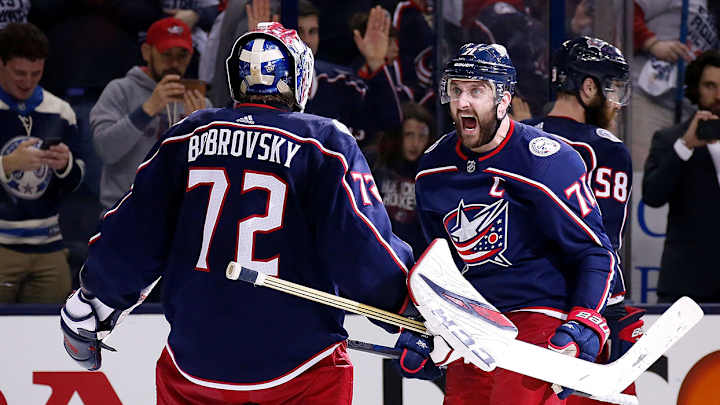Blue Jackets Silence Boston’s Big 3 to Seize 2-1 Series Lead

Hearing a dial tone? That’s because the line for Patrice Bergeron, Brad Marchand and David Pastrnak is disconnected. Frustrated and diminished, the Bruins trio has vanished for four consecutive games while the Blue Jackets survived and claimed a 2-1 series lead on Tuesday night.
There are no more excuses. The Boston Bruins aren’t beating themselves and they aren’t falling victim to lingering fatigue. After a two-day break, the Bruins were rested and they controlled the game’s first 10 minutes. Their fourth line knocked the Blue Jackets around behind the net, led by Sean Kuraly who played more like Jaromir Jagr than a depth forward while shaking off opponents. But Sergei Bobrovsky, as he has done during these playoffs, warded off everything his opponents threw at him, and left the Bruins with nothing to show for a strong opening gambit.
The Blue Jackets have withered the Bruins' once-feared power play and left Boston’s unit shotless in its first opportunity. Prime the piece and load the cannon. The Blue Jackets fed off the penalty kill and surged, while Bobrovsky continued to thwart the Bruins. Light the match. With 83 seconds to go in the period, Boone Jenner cut across the grain, hopped the puck by Connor Clifton and slid the puck past Tuukka Rask’s left pad. The cannon at Nationwide Arena boomed for the first time in the second round, and the Blue Jackets snagged a 1–0 lead before the first intermission. Spoiler: Columbus never let go.
Zdeno Chara’s lunging stick in the crease prevented Jenner from doubling the lead midway through the second period, but the infamous, undisciplined side of Brad Marchand materialized to cross-check Jenner in the face right after. The Blue Jackets never seemed to leave the offensive zone on the ensuing power play and, of course, Game 2 overtime hero Matt Duchene banged home a rebound past Rask. Bobrovsky stayed hot, splaying out with his blocker to clear the puck out of the crease, but Bruins winger Jake DeBrusk found a crack and trickled a goal through Bobrovsky’s five hole with 40 seconds left in the second period.
There were a few more cracks, but the goal post saved what Bobrovsky couldn’t. The 30-year-old goaltender finished with 36 saves on 37 shots while the Blue Jackets withstood the Bruins third-period onslaught and escaped with a 2–1 win.
How did the Blue Jackets beat the Lightning? The same way they are playing the Bruins. Columbus is playing good hockey in its simplest form. There are no frills. There’s a touch more physicality but the Blue Jackets aren’t pummeling their opponent into submission. They’re suffocating and swarming the puck when they don’t have it and they’re driving it to the net when they do. Columbus is converting a league-high 40% of its power plays and killing them at an 88% clip.
That—losing while sometimes having more scoring opportunities and playing well—is frustrating in itself, and then the Lightning and Bruins have seen Bobrovsky steal game after game on the other end. Artemi Panarin, who is playing at a level worthy of the boatload of cash coming his way this offseason, and Duchene has lived up to expectations when the Blue Jackets acquired him at the deadline. There aren’t any fancy systems, tricks or illusions to see here.
Marchand punctuated the Game 3 loss by throwing a cheap shot to the back of Blue Jackets defenseman Scott Harrington’s head. Down 2–1 with the next game in Columbus, Marchand has once again devolved into the recalcitrant villain, Bergeron has taken back-breaking penalties in consecutive games and Pastrnak’s play has him edging closer to the end of their bench. The Blue Jackets have already buried away Nikita Kucherov, Steven Stamkos, Brayden Point and Victor Hedman’s dazzling regular seasons. Time is running out, and Boston’s Big 3 is creeping toward a similar fate.
